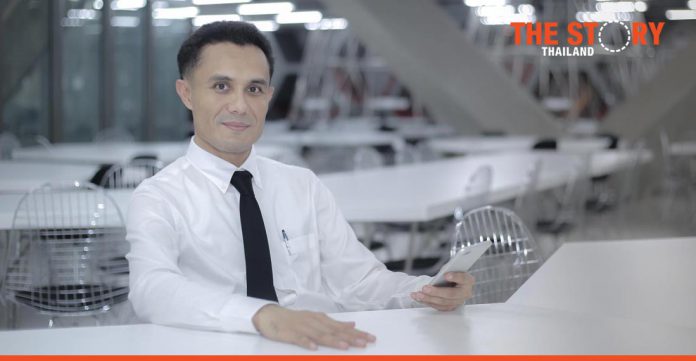Lessons in how to bring a big institution into the digital age
Khon Kaen University (KKU) – the biggest seat of learning in Thailand’s northeast – is rapidly becoming an example of a how a major organization that daily boasts a population of more than 50,000 can become a fully digital operation.
At only 58 years old, KKU has recently overhauled many aspects of its organization, including education, research, academic services and others. As part of the overhaul, the university has integrated digital technologies into all of its strategies, with the aim of increasing efficiency, lowering costs, and providing greater services.
- NECTEC push to boost Industry 4.0
- AIS launches first 5G fixed wireless access service
- Making TikTok’s short video clips is not easy
KKU’s Vice President for Digital-University Development, Dr. Denphong Sudphakdee, told The Story Thailand that the digital transformation involves people, technologies, work procedures, product delivery and educational changes.
He said KKU has been developing its technologies for a long time. Now, these technologies have become “big jigsaw pieces” enabling a rapid digital transformation and upgrade, because the university’s academic staff and students are already familiar with digital tools. The ecosystem at KKU also has adequate resources for further development. For example, existing technologies enable paperless and cashless operations, both at the same time.
The university’s hospital, which boasts digital infrastructure including an email system, data-storage space and online lessons, manages its own patient-information system.
“The transformation of an educational institute is no different to that of a business organization. As we intend to transform, we have to adjust our work procedures and integrate automation,” Denphong explained.
He said KKU has set up a team to work on its transformation, with members ranging from executives down to operational staff. This team is in charge of planning how the university will change. When plans are finalized, everyone involved is made aware of the details.
While the COVID-19 pandemic sped up the transformation, some of the plans had to be shelved. For example, KKU intended to send its students overseas to learn about digital tools, but overseas trips were among the first casualties of the pandemic.
“Personally, I don’t think that the world will shift fully into digital mode; I don’t think we’ll see a time when people no longer come to universities,” Denphong said. “Students may learn online, but they will definitely still want to meet their friends. Aside for that, some academic fields require the use of research facilities – something online classes cannot replicate.”
Digital upgrade for the future of education
KKU covers more than 800 hectares (5,000 rai) of land in Khon Kaen province and a further 80 hectares (500 rai) in Nong Khai province, to the north. It currently has 40,000 students and about 10,000 faculty members. This means there are more than 50,000 people on its campuses every day.
Covering that area and that number of people makes for an impressive digital operation. For example, nearly 100,000 devices have access to KKU’s internet system, underlining solid demand for the internet. At present, the campuses have 8,000 WiFi hotspots with a bandwidth of 100 Gbps. Fiber-optic cables with a combined length of more than 200 kilometers meet demand for internet access. Fiber-optic cables are now fitted to every one of about 1,000 rooms in KKU’s old student’s dorms to ensure that students do not have to scramble for a WiFi signal. In addition, bandwidth has been increased to accommodate students’ needs to study online.
“Our dormitories have between 2,000 and 3,000 units,” Denphong said. “The new dorms already have quite good WiFi. So, after fiber-optic internet services proved to require less maintenance, we decided to bring the fiber-optic option to our old dorms.”
He said the university’s students were now practically forced to embrace hybrid learning.
Instead of sitting in class for face-to-face lessons, students now have to study online much of the time, and each faculty has challenges in designing their courses.
It is difficult to produce teaching materials. Normally, lecturers give lectures. But when it comes to lab classes, video recordings are needed, to show students what to do. Sometimes, video-recording staff do not know where to focus during recordings, so they must work more closely with lecturers and use more advanced production techniques to ensure students can understand the content in online lessons.
- AIS committed to upgrading e-sports
- Giant’s-eye view of a business world in turmoil
- QueQ sees potential as an enabler of social distancing
Regarding software, KKU has been using cloud systems for about seven years. Faculty members all have digital IDs. Since the university has ceased to use paper documents, digital signatures are common among its more than 10,000 personnel. It has integrated chatbots into an open-source e-learning program called “Moodle.” All lecturers are required to learn how to use this program, as well as Google classroom. For paperwork and video meetings, it uses Microsoft 365 and Zoom.
“We need to identify our appeal in this ever-changing world and engage more in the digital sphere. Efficiency and cost reduction are key elements too. When we can curb costs, we can reduce people’s expenses. KKU has not raised tuition fees for about 10 years, even in the face of rising costs,” Denphong said, “Our main goal is to deliver great services to people, students, patients and sick animals” – a reference to the university’s extensive veterinary teaching hospital.





